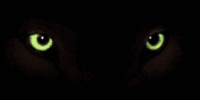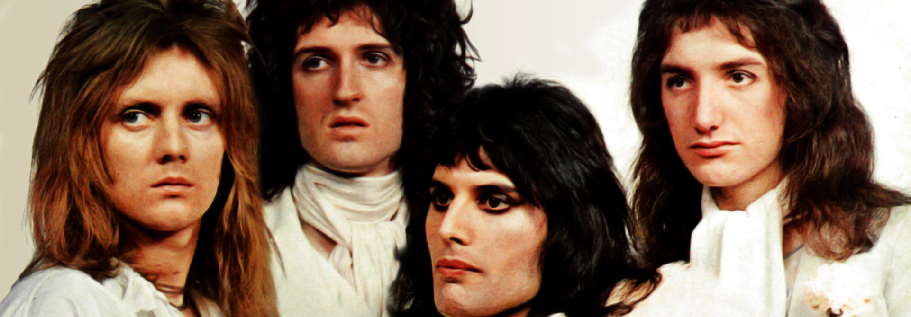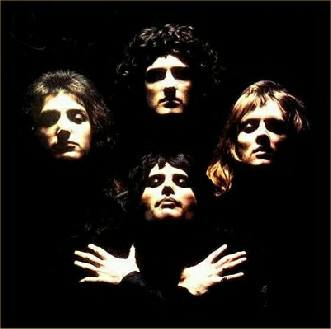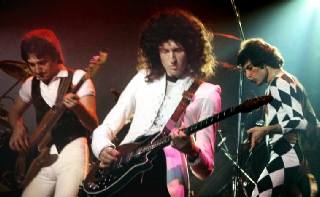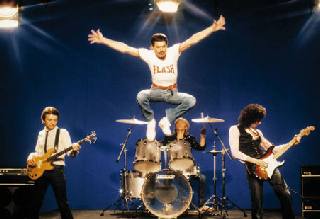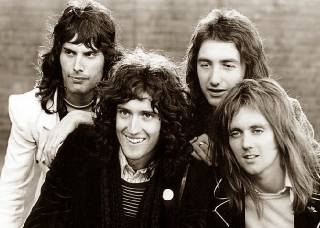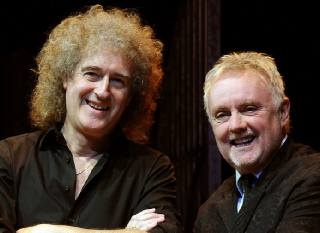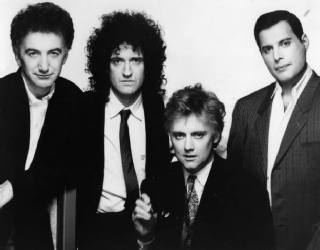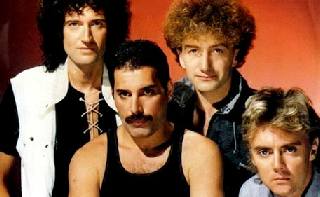The band have released a total of 18 number one albums, 18 number one singles, and 10 number one DVDs. Estimates of their record sales generally range from 150 million to 300 million records, making them one of the world's best-selling music artists. They received the Outstanding Contribution to British Music Award from the British Phonographic Industry in 1990, and were inducted into the Rock and Roll Hall of Fame in 2001.
In 1968, guitarist Brian May, a student at London's Imperial College, and bassist Tim Staffell decided to form a band. May placed an advertisement on the college notice board for a "Mitch Mitchell/Ginger Baker type" drummer; Roger Taylor, a young dental student, auditioned and got the job. The group called themselves Smile.
While attending Ealing Art College, Tim Staffell became friends with Farrokh Bulsara, a fellow student who had assumed the English name of Freddie. Bulsara felt that he and the band had the same tastes and soon became a keen fan of Smile. In late 1970, after Staffell left to join the band Humpy Bong, the remaining Smile members, encouraged by Bulsara, changed their name to "Queen" and continued working together. When asked about the name, Bulsara explained, "I thought up the name Queen. It's just a name, but it's very regal obviously, and it sounds splendid. It's a strong name, very universal and immediate. It had a lot of visual potential and was open to all sorts of interpretations. I was certainly aware of gay connotations, but that was just one facet of it."
The band had a number of bass players during this period who did not fit with the band's chemistry. It was not until February 1971 that they settled on John Deacon and began to rehearse for their first album. They recorded four of their own songs, "Liar", "Keep Yourself Alive", "The Night Comes Down" and "Jesus", for a demo tape; no record companies were interested. It was also around this time Freddie changed his surname to "Mercury", inspired by the line "Mother Mercury, look what they've done to me" in the song "My Fairy King". On 2 July 1971, Queen played their first show in the classic line-up of Mercury, May, Deacon and Taylor at a Surrey college outside London.
Having attended art college, Mercury also designed Queen's logo, called the Queen crest, shortly before the release of the band's first album. The logo combines the zodiac signs of all four members: two lions for Leo (Deacon and Taylor), a crab for Cancer (May), and two fairies for Virgo (Mercury). The lions embrace a stylised letter Q, the crab rests atop the letter with flames rising directly above it, and the fairies are each sheltering below a lion. There is also a crown inside the Q and the whole logo is over-shadowed by an enormous phoenix. The whole symbol bears a passing resemblance to the Royal coat of arms of the United Kingdom, particularly with the lion supporters. The original logo, as found on the reverse-side of the first album cover, was a simple line drawing but more intricate colour versions were used on later sleeves.
In 1972 Queen entered discussions with Trident Studios after being spotted at De La Lane Studios by John Antony and after discussions were offered a management deal by Norman Sheffield under Neptune Productions, a subsidiary of Trident to manage the band and enable them to use the facilities at Trident to record new material whilst the management search for a record label to sign Queen. This suited both parties at the time as Trident were expanding into management and Queen under the deal were able to make use of the hi-tech recording facilities shared by bands at the time such as the Beatles and Elton John to produce new material. However Trident found it difficult to find a label for a band bearing a name with such connotation during the early 1970s.
In July 1973, Queen finally under a Trident/EMI deal released their eponymous debut album, an effort influenced by the heavy metal and progressive rock of the day. The album was received well by critics; Gordon Fletcher of Rolling Stone said "their debut album is superb", and Chicago's Daily Herald called it an "above average debut". It drew little mainstream attention, and the lead single "Keep Yourself Alive", a Brian May composition, sold poorly. Retrospectively, "Keep Yourself Alive" is cited as the highlight of the album, and in 2008 Rolling Stone ranked it 31st in the "100 Greatest Guitar Songs of All Time", describing it as "an entire album's worth of riffs crammed into a single song". The album was certified gold in the UK and the US.
The group's second LP, Queen II, was released in 1974, and features rock photographer Mick Rock's iconic image of the band on the cover. This image would be used as the basis for the 1975 "Bohemian Rhapsody" music video production. The album reached number five on the British album chart and became the first Queen album to chart in the UK. The Freddie Mercury-written lead single "Seven Seas of Rhye" reached number ten in the UK, giving the band their first hit. The album is the first real testament to the band's distinctive layered sound, and features long complex instrumental passages, fantasy-themed lyrics, and musical virtuosity. Aside from its only single, the album also included the song "The March of the Black Queen", a six-minute epic which lacks a chorus. The Daily Vault described the number as "menacing". Critical reaction was mixed; the Winnipeg Free Press, while praising the band's debut album, described Queen II as a "over-produced monstrosity". Allmusic has described the album as a favourite among the band's hardcore fans, and it is the first of three Queen albums to feature in the book 1001 Albums You Must Hear Before You Die.
At Live Aid, held at Wembley on 13 July 1985, in front of the biggest-ever TV audience of 1.9 billion, Queen performed some of their greatest hits, during which the sold-out stadium audience of 72,000 people clapped, sang, and swayed in unison. The show's organisers, Bob Geldof and Midge Ure, other musicians such as Elton John and Dave Grohl, and various music journalists writing for the BBC, CNN, Rolling Stone, The Telegraph among others, commented that Queen stole the show. An industry poll in 2005 named it the greatest rock performance of all time.
When interviewed for Mojo magazine the band said the most amazing sight at Live Aid was to see the audience clapping to "Radio Ga Ga". Brian May stated: "I'd never seen anything like that in my life and it wasn't calculated either. We understood our audience and played to them but that was one of those weird accidents because of the (music) video. I remember thinking 'oh great, they've picked it up' and then I thought 'this is not a Queen audience'. This is a general audience who've bought tickets before they even knew we were on the bill. And they all did it. How did they know? Nobody told them to do it."
The band, now revitalised by the response to Live Aid – a "shot in the arm" Roger Taylor called it, — and the ensuing increase in record sales, ended 1985 by releasing the single "One Vision", which was the third time after "Stone Cold Crazy" and "Under Pressure" that all four bandmembers received a writing credit for the one song. Also, a limited-edition boxed set containing all Queen albums to date was released under the title of The Complete Works. The package included previously unreleased material, most notably Queen's non-album single of Christmas 1984, titled "Thank God It's Christmas".
In early 1986, Queen recorded the album A Kind of Magic, containing several reworkings of songs written for the fantasy action film Highlander. The album was very successful, producing a string of hits, including the title track, "A Kind of Magic". Also charting from the album were "Friends Will Be Friends", "Who Wants to Live Forever" (featuring an orchestra conducted by Michael Kamen), and the de facto theme from Highlander, "Princes of the Universe".
In summer of 1986, Queen went on their final tour with Freddie Mercury. A sold-out tour in support of A Kind of Magic, once again they hired Spike Edney, leading to him being dubbed the unofficial fifth member. The Magic Tour's highlight was at Wembley Stadium in London and resulted in the live double album, Queen at Wembley, released on CD and as a live concert DVD, which has gone five times platinum in the US and four times platinum in the UK. Queen could not book Wembley for a third night, but they did play at Knebworth Park. The show sold out within two hours and over 120,000 fans packed the park for what was Queen's final live performance with Mercury. Queen began the tour at the Råsunda Stadium in Stockholm, Sweden, and during the tour the band performed a concert at Slane Castle, Ireland, in front of an audience of 95,000, which broke the venue's attendance record. The band also played behind the Iron Curtain when they performed to a crowd of 80,000 at the Népstadion in Budapest, in what was one of the biggest rock concerts ever held in Eastern Europe. More than one million people saw Queen on the tour—400,000 in the United Kingdom alone, a record at the time.
After working on various solo projects during 1988 (including Mercury's collaboration with Montserrat Caballé, Barcelona), the band released The Miracle in 1989. The album continued the direction of A Kind of Magic, using a pop-rock sound mixed with a few heavy numbers. It spawned the European hits "I Want It All", "Breakthru", "The Invisible Man", "Scandal", and "The Miracle". The Miracle also began a change in direction of Queen's songwriting philosophy. Since the band's beginning, nearly all songs had been written by and credited to a single member, with other members adding minimally. With The Miracle, the band's songwriting became more collaborative, and they vowed to credit the final product only to Queen as a group
After fans noticed Mercury's increasingly gaunt appearance in 1988, rumours began to spread that Mercury was suffering from AIDS. Mercury flatly denied this, insisting he was merely "exhausted" and too busy to provide interviews. The band decided to continue making albums, starting with The Miracle in 1989 and continuing with Innuendo in 1991. Despite his deteriorating health, the lead singer continued to contribute. For the last two albums made while Mercury was still alive, the band credited all songs to Queen, rather than specific members of the group, freeing them of internal conflict and differences. In 1990, Queen ended their contract with Capitol and signed with Disney's Hollywood Records, which has since remained the group's music catalogue owner in the United States and Canada. That same year, Mercury made his final public appearance when he joined the rest of Queen to collect the BRIT Award for Outstanding Contribution to British Music. Innuendo was released in early 1991 with an eponymous number 1 UK hit and other charting singles including, "The Show Must Go On". Mercury was increasingly ill and could barely walk when the band recorded "The Show Must Go On" in 1990. Because of this, May had concerns about whether he was physically capable of singing it. Recalling Mercury's successful performance May states; "he went in and killed it, completely lacerated that vocal". The band's second greatest hits compilation, Greatest Hits II, followed in October 1991, which is the eighth best-selling album of all time in the UK and has sold 16 million copies worldwide.
On 23 November 1991, in a prepared statement made on his deathbed, Mercury confirmed that he had AIDS. Within 24 hours of the statement, he died of bronchial pneumonia, which was brought on as a complication of AIDS. His funeral service on 27 November in Kensal Green, West London was private, and held in accordance with the Zoroastrian religious faith of his family. "Bohemian Rhapsody" was re-released as a single shortly after Mercury's death, with "These Are the Days of Our Lives" as the double A-side. The music video for "These Are the Days of Our Lives" contain Mercury's final scenes in front of the camera. The single went to number one in the UK, remaining there for five weeks – the only recording to top the Christmas chart twice and the only one to be number one in four different years (1975, 1976, 1991, and 1992). Initial proceeds from the single – approximately £1,000,000 – were donated to the Terrence Higgins Trust. Queen's popularity was stimulated in the United States when "Bohemian Rhapsody" was featured in the 1992 comedy film Wayne's World. Its inclusion helped the song reach number two on the Billboard Hot 100 for five weeks in 1992 (it remained in the Hot 100 for over 40 weeks), and won the band an MTV Award at the 1992 MTV Video Music Awards. The compilation album Classic Queen also reached number four on the Billboard 200, and is certified three times platinum in the US. Wayne's World footage was used to make a new music video for "Bohemian Rhapsody", with which the band and management were delighted.
On 20 April 1992, The Freddie Mercury Tribute Concert was held at London's Wembley Stadium to a 72,000-strong crowd. Performers, including Def Leppard, Robert Plant, Guns N' Roses, Elton John, David Bowie, George Michael, Annie Lennox, Seal, Extreme, and Metallica performed various Queen songs along with the three remaining Queen members (and Spike Edney.) The concert is listed in the Guinness Book of Records as "The largest rock star benefit concert", as it was televised to over 1.2 billion viewers worldwide, and raised over £20,000,000 for AIDS charities.
In 2002, Queen's "Bohemian Rhapsody" was voted "the UK's favourite hit of all time" in a poll conducted by the Guinness World Records British Hit Singles Book, and in 2004 the song was inducted into the Grammy Hall of Fame. Acclaimed for their stadium rock, in 2005 an industry poll ranked Queen's performance at Live Aid in 1985 as the best live act in history. In 2007, they were also voted the greatest British band in history by BBC Radio 2 listeners.
As of 2005, according to the Guinness Book of World Records, Queen albums have spent a total of 1,322 weeks (twenty-six years) on the UK Album Charts, more time than any other musical act. Also in 2005, with the release of their live album with Paul Rodgers, Queen moved into third place on the list of acts with the most aggregate time spent on the British record charts. In 2006, the Greatest Hits album was the all-time best-selling album in UK Chart history, with sales of 5,407,587 copies, over 604,295 more copies than its nearest competitor, the Beatles' Sgt. Pepper's Lonely Hearts Club Band. Their Greatest Hits II album is the seventh best seller, with sales of 3,746,404 copies.
The band have released a total of eighteen number one albums, eighteen number one singles, and ten number one DVDs worldwide, making them one of the world's best-selling music artists. Queen have sold over 150 million records, with some estimates in excess of 300 million records worldwide, including 34.5 million albums in the United States alone as of 2004. Inducted into the Rock and Roll Hall of Fame in 2001, the band is also the only group in which every member has composed more than one chart-topping single, and all four members of Queen were inducted into the Songwriters Hall of Fame in 2003. In 2009, "We Will Rock You" and "We Are the Champions" were inducted into the Grammy Hall of Fame, and the latter was voted the world's favourite song in a global music poll.
Queen are one of the most bootlegged bands ever, according to Nick Weymouth, who manages the band's official website. A 2001 survey discovered the existence of 12,225 websites dedicated to Queen bootlegs, the highest number for any band. Bootleg recordings have contributed to the band's popularity in certain countries where Western music is censored, such as Iran. In a project called Queen: The Top 100 Bootlegs, many of these have been made officially available to download for a nominal fee from Queen's website, with profits going to the Mercury Phoenix Trust. Rolling Stone ranked Queen at number 52 on its list of the "100 Greatest Artists of All Time", while ranking Mercury the 18th greatest singer, and May the twenty-sixth greatest guitarist. Queen were named 13th on VH1's 100 Greatest Artists of Hard Rock list, and in 2010 were ranked 17th on VH1's 100 Greatest Artists of All Time list. In 2012, Gigwise readers named Queen the best band of past 60 years. Visitors to Play.com voted them as the best music artist of the last 60 years in their list of "Top 100 Music Artists" in 2013.














